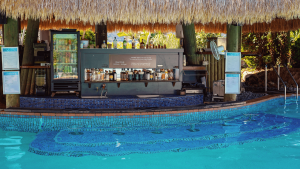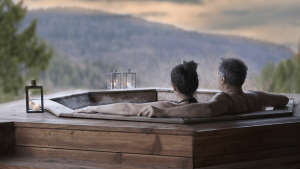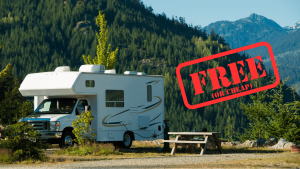To find the best long-term RV park, determine your priorities, such as location, amenities, and budget. Then, utilize online resources like Google search and park rental websites and read reviews of firsthand experiences.
Of course, that’s a high-level overview. Committing to an RV park long-term is a major decision with many important considerations.
Below, we walk you through exactly how to find the best long-term parks near you or wherever your desired location may be.
What is a Long-Term RV Park?
A long-term RV park is a designated area specifically designed for RVers who wish to stay for extended periods, typically ranging from a month to a year or even longer. Unlike traditional campgrounds or RV parks that cater to short-term stays, these parks offer amenities and services tailored to those embracing the RV lifestyle for longer durations.
Features of Long-Term RV Parks
Amenities
Long-term RV parks often provide a range of amenities that make living in an RV similar to a stationary home. These amenities can include laundry facilities, Wi-Fi access, recreational areas, and sometimes clubhouses or community centers.
Rates
One of the primary distinctions between short-term and long-term RV parks is the rate structure. While short-term parks typically charge by the night, long-term parks offer monthly or even yearly rates, often at a discounted flat rate, making it more economical for a several-month stay.
Site Size
Given that many RVers bring along additional vehicles or set up more permanent fixtures around their RVs during long stays, the sites in long-term RV parks are often larger. This extra space can accommodate things like patios, storage sheds, or even small gardens.
Rules & Regulations
With longer stays come a different set of rules. These parks often have specific guidelines about things like mail delivery, site upkeep, and the types of RVs or motorhomes allowed. Some parks might even have age restrictions on the RVs, ensuring they meet certain standards.
Location
Many long-term RV parks are strategically located near urban centers or popular destinations, ensuring that residents have easy access to essential services, job opportunities, and entertainment options. For instance, a popular long-term destination, Florida has many long-term RV parks catering to retirees and working professionals.
Community
One of the best aspects of long-term RV parks is the sense of community they foster. Given that many RVers stay for months at a time, it’s common for residents to form close-knit bonds, participate in group activities, and support one another in their RV lifestyle.
A long-term RV park is more than just a place to park your camper or motorhome. For many, it’s a community, a home base, and a way of life. Whether you’re a retiree looking to explore the state at your own pace, a working professional taking advantage of the RV lifestyle, or someone in between, these parks offer the amenities, rates, and community to make your extended stay comfortable and fulfilling.
Types of Long-Term RV Parks
Long-term RV parks can be categorized by the length of stay. Depending on the park, they may offer one or all of the below. Let’s dive into the various types of long-term RV parks and what they offer.
Monthly RV Parking
Monthly RV parking is an option that allows RVers to rent a site for an entire month. This type of parking is ideal for those who:
- Are on an extended vacation and want to explore a particular area in depth.
- Have work commitments in a specific location for a month.
- Are testing out the RV lifestyle and aren’t ready to commit to a longer-term stay.
Features:
- Flexibility: Monthly RV parking offers a balance between short-term stays and year-long commitments. RVers can move if they choose or extend their stay.
- Cost-Effective: Many parks offer discounted monthly rates compared to daily rates.
- Stable Amenities: With a month-long stay, RVers can fully utilize the park’s amenities, from laundry facilities to recreational areas.
Seasonal RV Parking
Seasonal RV parking caters to those who wish to stay in a particular location for a specific season. Whether escaping the cold northern winters or enjoying the summer in a mountainous region, seasonal parking is the go-to option.
Features:
- Extended Stays: RVers can stay for several months, aligning with a particular season.
- Community Building: Staying for a season allows RVers to build relationships with fellow campers, leading to a tight-knit community feel.
- Location-Specific: Many seasonal RV parks are located in areas with seasonal attractions, such as beaches, ski resorts, or fall foliage regions.
Year-Round Long-Term RV Parks
Year-round, long-term RV parks are the ultimate choice for those who fully embrace the RV lifestyle. These parks are equipped to handle the needs of RVers who choose to stay for an entire year or even longer.
Features:
- Permanent Setup: RVers can often set up their site with additional features like patios, sheds, or gardens.
- Cost Savings: Yearly rates are often significantly discounted compared to monthly or daily rates.
- Community and Events: With extended stays, parks often organize events, clubs, and activities for residents, fostering a strong sense of community.
- Comprehensive Amenities: From mail services to on-site utilities and maintenance, these parks often offer RVers everything they need for a comfortable stay.
Tip: Read our guide to finding the best year round campgrounds near you. Plus, view our top campground pick for each state!
How to Find the Best Long-Term RV Parks Near You
Long-term RV parks offer a home away from home, and finding the right one can significantly enhance your RVing experience. Here’s a step-by-step guide to help you find the best long-term RV parks near you.
1. Choose a Location
Before diving into the specifics of RV parks, decide on a location. Consider factors like:
- Weather: Some people prefer the sunny beaches of Florida, while others might be looking for a cooler mountainous area.
- Proximity to a City: Being near a city can provide easy access to amenities, entertainment, and medical facilities.
- Nature and Scenery: For those looking to immerse themselves in nature, parks near forests, lakes, or beaches might be ideal.
2. Determine Your Needs
Every RVer has unique needs. Some of the factors to consider include:
- Amenities: Do you need a park with a pool, laundry facilities, or a clubhouse?
- Site Size: Larger motorhomes or trailers might require more spacious sites.
- Rates: Determine your budget for the stay. Some parks offer a flat rate for long-term stays, making them more economical.
- Family and Pet-Friendly: If traveling with family or pets, ensure the park caters to their needs.
3. Finding the Best Long-Term RV Parks
Online Search

A simple online search with terms like “long-term RV parks near me” on Google, Bing, or your search engine of choice should return some fairly decent options.
Unfortunately, search engines still aren’t great at returning relevant results. As you can see in the screenshot above, there are two mobile home parks that do not cater to RVs in the top 3 results.
Websites & Apps

Several websites and apps cater specifically to RVers. Some of the most popular ones include:
- The Dyrt: A comprehensive platform with reviews and details about various campgrounds and RV parks.
- HipCamp: This site offers unique camping experiences, from traditional RV parks to more rustic sites.
- Escapees RV Club: A community-driven platform offering insights and recommendations from fellow RVers.
- RVProperty.com: A platform to find RV lots for rent or sale.
- Campendium: Offers detailed reviews and photos from the RV community.
- AllStays: Provides information on RV parks, rest areas, and services.
- KOA (Kampgrounds of America): A trusted name in the RV industry, KOA offers parks with consistent amenities and standards.
Ask Other RV’ers
One of the best resources is the RV community itself. Engage with other RVers, whether online or in person, to get recommendations. They can provide insights that websites or reviews might miss.
4. Create a Short List of RV Parks
After your initial research, create a list of potential RV parks that meet your criteria. Consider factors like amenities, location, and rates.
5. Contact RV Parks
Once you have a shortlist, reach out to these RV parks. This step is optional, but it’s a good idea to get confirmation on the following before booking your stay:
- Availability: Especially during peak seasons, spots can fill up quickly.
- Rates: Confirm the price for long-term stays. Some parks might offer discounts for extended stays.
- Rules and Regulations: Each park will have its own set of rules, from pet policies to quiet hours.
6. Choose & Book Your Long-Term RV Park
After contacting the parks and gathering all the necessary information, it’s time to decide. Consider all factors, from the amenities and rates to the vibe and community of the park. Once you’ve made your choice, book your spot and prepare for your extended stay.
What to Look for in a Long-Term RV Park
Choosing the right long-term RV park is essential for a comfortable and enjoyable extended stay. Here’s a detailed guide on what to consider when selecting a long-term RV park.
Price
Budgeting is a fundamental aspect of any long-term travel plan. When considering an RV park:
- Compare Rates: Different parks have varying price structures. Some might offer monthly campground rates, while others offer discounts for longer stays.
- Hidden Costs: Beyond the site rental, inquire about additional costs such as utility fees, Wi-Fi charges, or maintenance fees.
- Discounts: Some parks offer discounts for members of specific RV clubs or associations.
See how much RV parks cost and get real-life pricing examples and ways to save money on park fees.
Amenities

An RV park’s amenities can significantly impact your comfort and convenience during your stay.
- Basic Facilities: Ensure the park has essential facilities like clean restrooms, laundry rooms, and dump stations.
- Recreational Amenities: Features like swimming pools, clubhouses, and recreational areas can enhance your stay.
- Connectivity: Reliable Wi-Fi or internet access is vital for many RVers, especially those working on the road.
Location
The park’s location can influence your daily activities and overall experience.
- Close to Work: If you’re working while on the road, proximity to your workplace can save time and fuel costs.
- Recreational Activities: Being near your favorite activities, whether it’s hiking, fishing, or just laying out on the beach, can enhance your leisure time.
- Essential Services: Ensure the park is close to essential services like grocery stores, medical facilities, repair shops, or anything else you deem important.
Weather
Weather plays a pivotal role in the RVing experience.
- Seasonal Changes: Some parks are perfect for summer but might not be suitable for winter. Ensure the park can accommodate your RV in all seasons.
- Climate Preferences: If you prefer milder climates, consider parks in locations with temperate weather year-round.
Rules and Regulations
Every RV park has its own set of rules and guidelines.
- Pet Policies: If you’re traveling with pets, check the park’s pet policies.
- Quiet Hours: Some parks have designated quiet hours to ensure a peaceful environment for all residents.
- Vehicle Maintenance: Some parks might have rules about performing vehicle maintenance on-site.
Important: Rules and regulations can vary, with some parks having, in my opinion, some pretty ridiculous rules. The first thing I always check before reserving a campsite for any length of time are the park rules.
Length Requirements
The duration of your intended stay can influence your choice of park.
- Maximum Stay: Some parks might limit how long you can stay consecutively.
- Reservation Policies: For popular parks, knowing how far in advance you need to book to secure a spot for an extended period is essential.
Benefits Of Long-Term Camping

Long-term camping, especially in an RV, has gained immense popularity over the years. Many individuals and families choose this lifestyle, whether temporarily or permanently, for many reasons.
Cost Savings
One of the most apparent advantages of long-term camping is the potential for significant cost savings.
- Discounted Rates: Many RV parks offer discounted rates for extended stays, making it more affordable for long-term campers.
- Minimalistic Lifestyle: Living in an RV often means adopting a more minimalistic lifestyle, which can lead to fewer unnecessary purchases and expenses. It’s tough to be a hoarder when space is limited!
Stability
While camping might seem synonymous with constant travel, long-term camping can provide a sense of stability.
- Familiar Environment: Staying in one place for an extended period allows campers to set up their space just the way they like it, making it feel more like home.
- Routine: Long-term camping can provide the opportunity to establish a daily routine, similar to living in a sticks-and-bricks home.
Freedom
One of the most cherished aspects of long-term camping is the unparalleled freedom it offers.
- Location Independence: Campers can stay near the mountains, by the beach, or anywhere they desire.
- Flexibility: Long-term campers can easily relocate to a new site or area if the mood strikes or circumstances change.
Community
Long-term camping often leads to the formation of tight-knit communities.
- Shared Experiences: Being in an RV park or campground for an extended period allows campers to bond over shared experiences and adventures.
- Support System: Fellow campers often become a support system, offering help, advice, and companionship.
Avoid the Cold & Extreme Heat
For those who prefer milder climates, long-term camping offers the perfect solution. Campers can move to warmer locations during the winter months and back North in the summer months to avoid the extreme heat.
Tips for Living in an RV Park Long-Term
Choosing to live in an RV park long-term is a unique experience that comes with its own set of challenges and rewards. To make the most of this lifestyle and ensure a comfortable and enjoyable stay, consider the following tips.
Building Relationships with Neighbors and Park Staff
Fostering good relationships within the park can enhance your overall experience.
- Open Communication: Regularly communicate with park staff about any concerns or needs. They can provide valuable insights and assistance.
- Neighborly Etiquette: Respect the privacy and boundaries of your neighbors. A simple gesture like greeting them can go a long way.
- Shared Resources: Sometimes, neighbors pool resources, like tools or equipment, fostering a sense of community.
Setting Up Your RV for Extended Comfort
Living in an RV long-term requires some adjustments for maximum comfort.
- Optimize Space: Utilize space-saving solutions like multi-purpose furniture and wall-mounted storage.
- Weatherproofing: Ensure your RV is equipped to handle the local climate, from insulation to proper ventilation.
- Personal Touch: Add personal touches to make your RV feel more like home, such as decor, curtains, or plants.
Staying Safe and Ensuring Your RV’s Security
Safety and security are paramount when living in an RV park long-term.
- Lock Systems: Invest in quality locks for your RV doors and storage compartments.
- Lighting: Ensure the area around your RV is well-lit to deter potential intruders.
- Know Your Neighbors: Familiarity with those around you can add an extra layer of security, as you can look out for one another.
Managing Utilities and Waste Effectively
Proper utility management ensures a smooth stay without any hitches.
- Regular Maintenance: Regularly check your water, electricity, and gas connections for any issues.
- Waste Management: Familiarize yourself with the park’s waste disposal system. Regularly empty and clean waste tanks to prevent odors and blockages.
- Energy Conservation: Adopt energy-saving practices, like using LED lights and unplugging devices when not in use.
Engaging in Local Activities and Community Events
Being an active member of the community can make your long-term stay more fulfilling.
- Participate in Events: Many RV parks organize events, from potlucks to movie nights. Participating can be a great way to socialize and make friends.
- Explore Locally: Take the time to explore the local area, from parks and hiking trails to local markets and festivals.
- Volunteer: Consider volunteering in local community projects or events. It’s a great way to give back and integrate into the community.
FAQs
Can You Live in an RV Park Year-Round?
Yes, you can live in an RV park year-round, as many campers do. Typically, RV parks aren’t bound by local ordinances that might prevent extended RV living. However, not every park offers long-term rentals. The duration of stay permitted can differ based on the park’s location and the time of year, with some parks imposing shorter stay limits during peak seasons.
Related: Where Can I Park My RV to Live Long-Term?
How Much Do Long-Term RV Parks Cost?
The cost of staying in a long-term RV park varies based on factors like location, amenities, and the duration of stay. Parks in prime tourist spots or near major cities might have higher rates compared to those in remote areas. Additionally, parks with extensive amenities might charge more. On average, long-term RV park costs can range from $300 to $1,500 per month, though this can fluctuate based on the specific park and its offerings.
For example, Silver Springs RV park in Silver Springs, Florida, offers Monthly and 6-month rates for their long-term occupants. Their monthly rates range from $575 to $795, depending on the season and amp-service.

What Is the Best State for Full-Time RVers?

The best state for full-time RVers often depends on personal preferences. However, Florida, Texas, and South Dakota are popular choices. Florida and Texas are favored for their warm climates and lack of state income tax. South Dakota attracts RVers with its straightforward residency requirements and absence of state income tax.







Write a comment